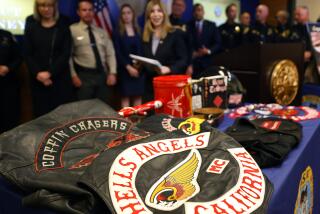3rd Man Convicted in Spearing Death : Courts: Juan Alcocer, 20, is latest defendant to be found guilty in the killing of Steve Woods, who was stabbed through the head with a paint-roller rod in attack at beach park.
SANTA ANA — Jurors deliberated just two hours Tuesday before convicting a third young man of second-degree murder for the death of a San Clemente teen-ager who was speared through the head with a paint-roller rod.
Juan Alcocer, 20, stared straight ahead as the jury also found him guilty of nine other felonies, including conspiracy, six assault counts and participating in gang activity during the October, 1993, attack on 17-year-old Steve Woods.
Jurors declined to comment after announcing their verdicts. Kathy Woods, the victim’s mother, said she wanted to thank the jury for the speedy verdict but said her heart is still broken over the tragedy.
“I’m pleased it was very fast,” said Kathy Woods, who sat through much of the weeklong trial in Orange County Superior Court. “It doesn’t bring my son back, but it’s some kind of justice.”
Defense attorney Gene E. Dorney said his client threw a piece of wood at the victim and his friends but was acting in self defense. Dorney argued to jurors that his client was unfairly being held responsible for the actions of others, and vowed to appeal the case.
“We are bitterly disappointed,” he said.
Alcocer faces a possible prison term of at least 15 years to life when he is sentenced Jan. 27.
The Woods killing gained widespread attention because of the freakish nature of the injuries in a beach community where gang violence was unusual.
The case triggered countywide outrage over crime. It also sparked concern among some Latino residents, who contended that racism may have played a role in the filing of murder charges against the Latino defendants.
Parents of two other young men who are accused of helping kill Woods said they came to the courtroom to support Alcocer, whose parents are in Mexico.
“We expected this decision because Woods is a white boy and he (Alcocer) is Mexican,” said Victor Villalobos, whose son, 19-year-old Arturo Villalobos, has pleaded guilty to voluntary manslaughter for his role in the attack and participating in gang activity.
“This is a game. It’s just a game. They’re trying to clean the streets of Mexicans,” Victor Villalobos said, adding that Alcocer is a serious young man, a good student, and a hard worker.
But Deputy Dist. Atty. Gary Paer said the charges and convictions have been based on the facts--not the race of the victim or defendants. Paer noted that the jury reached the same verdict that a judge reached during an earlier, unrelated trial for two of Alcocer’s co-defendants.
“You have consistencies in the verdicts, which I think shows that our theory was not something that was concocted or contrived,” Paer said. “It’s now been put to the legal test twice. It’s just an appropriate verdict.”
Prosecutors say that all of the defendants are responsible for Woods’ death because they joined in and acted together to hurl bottles, wood chunks and other items at the teen-ager and his friends. Someone threw the paint roller that lodged in Woods’ head, but prosecutors have not named a culprit.
Hector Penuelas, 17, and Julio Bonilla, 18, were tried as adults and convicted of second-degree murder, conspiracy, assault and gang involvement charges in the attack during a non-jury trial. Penuelas, Bonilla and Villalobos also await sentencing.
Woods and Alcocer were hanging out with their respective friends at Calafia Beach County Park when a dispute broke out between the two groups. Woods’ friends testified they were forced to drive by the other group to get to the park’s only exit when they were bombarded with the makeshift weapons.
But many of the defendants said they hurled the items in self defense because they believed the teen-agers were going to run them over.
Most of the weapons bounced off the vehicles, but Woods was sitting in the passenger seat of a friend’s car when the paint-roller crashed though the window and pierced through his skull. Woods was in a coma for 25 days before dying.
Dorney said Alcocer was not a gang member but did associate with gang members in his neighborhood. Dorney said his client is unfairly being held responsible for the acts of others.
“He never embraced gang belief, he just grew up in close quarters with these people in his neighborhood,” said Dorney.
More to Read
Sign up for Essential California
The most important California stories and recommendations in your inbox every morning.
You may occasionally receive promotional content from the Los Angeles Times.











